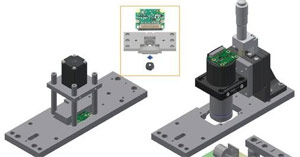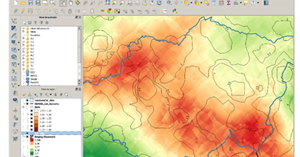 The program's Study program has 60 ECTS credit
The program's Study program has 60 ECTS credit
![]() 26 ECTS credit - work end of Master's Degree
26 ECTS credit - work end of Master's Degree
![]() 22 ECTS credit - Compulsory subjects
22 ECTS credit - Compulsory subjects
![]() 12 ECTS credit - Electives
12 ECTS credit - Electives

 MODULES, SUBJECTS AND SUBJECTS
MODULES, SUBJECTS AND SUBJECTS 
| MODULE | SUBJECT | SUBJECT | OP/OB | ECTS CREDIT |
| 1 work End of Master's Degree |
1.1 | OB | 26 | |
| 2 General |
2.1 | OB | 2 | |
| 2.2 Science of data and models in experimental sciences. |
OB | 5 | ||
| OB | 5 | |||
| 2.3 Introduction to Bioinformatics |
OB | 5 | ||
| OB | 5 | |||
| 3 Elective |
3.1 Electives |
OP | 3 | |
| OP | 3 | |||
| OP | 3 | |||
| OP | 3 | |||
| OP | 3 | |||
| OP | 3 | |||
| OP | 3 | |||
| OP | 3 | |||
| OP | 3 | |||
| OP | 3 | |||
| OP | 3 |
 project end of Master's Degree
project end of Master's Degree
The Master's Degree has an orientation internship: from the first day, each student will start a project on his or her area of interest to apply in a real case the IT tools explained in the subjects.
The TFM (26 ECTS credit) is a work directed by a tutor, who must first meet with the student. It begins on the first day of the course and constitutes the pivot around which the Master's Degree revolves.
Many researchers at the University of Navarra and research center Applied Medicine (CIMA) offer TFM degrees that they are willing to supervise. Alternatively, the student can look for a professor willing to supervise a work of his/her interest and propose it as a TFM. In addition, there are agreements in place with companies interested in hosting a student from Master's Degree to conduct their TFM at business.
 TFM Proposals
TFM Proposals 
project
Exploration of algorithms for identifying symptom trajectories reported by patients undergoing cancer treatment
Director: Mikel Hernaez
Co-director: Maider Alberich (Naru Intelligence)
project
Surface Doping of Proteins to Program Substrate Selectivity While Preserving Core Packing
Director: Juan Pablo Fuenzalida
project
From Cells to Rivers: Machine-Learning Decoding of Environmental Water Quality Using Fluorescent Sensor Proteins
Director: Juan Pablo Fuenzalida
Co-director: Yasser Morera
project
Analysis of microproteins to identify new antitumor therapies
Director: Puri Fortes
project
AI-based computational pathology to identify cell types and neighborhoods that are likely associated with antitumor immunotherapy efficacy
Director: Carlos De Andrea
Co-director: José Echeveste
project
Multivariate analysis of the influence of environmental factors on the proliferation of toxic algae in Spanish reservoirs
Director: Yasser Morera
project
Aggregation of structured data
Director: Jorge Elorza
project
Artificial Intelligence (AI) to define actionable genetic risk
Director: Carlos Ruiz Arenas
Co-director: Mikel Hernaez
project
Mass drug repositioning using Graph Neural Networks
Director: Mikel Hernaez
project
Machine learning models to elucidate the transcriptional dynamics in mCRPC at single-cell resolution
Director: Mikel Hernaez
project
Towards a virtual CAR-T cell via Deep Generative models
Director: Mikel Hernaez
project
Unraveling the genetic makeup of rare diseases through AI and advanced sequencing technologies
Director: Mikel Hernaez
Co-director: Ana Patiño
project
Synthesis and characterization of metal-organic framework (MOF) materials and their application as adsorbents
Director: Francisco Javier Peñas
Co-director: Adrián Durán
project
Multimodal Analysis and data Integration data High-Resolution Spatial Transcriptomics (Visium HD)
Director: Sandra Hervás Stubbs
Co-director: Ángel M. Martínez Montes
project
Combination of data for the prevention of atrial fibrillation recurrence in essay
Director: Cristina Razquin
Co-director: Miguel Ruiz Canela
project nº1
iterative proteindesign for genetically encoded polymers (GEPs)
Director: Juan Pablo Fuenzalida
project nº2 - ASSIGNED
Analysis of microproteins to identify new antitumor therapies
Director: Puri Fortes
project nº3
AI-based computational pathology to identify cell types and neighborhoods
Director: Carlos E de Andrea
Co-director: José Echeveste
project nº4
assessment of the contact pressure patterns of different regions of the human body
Director: Diego Maza
project nº5
Aggregation of structured data
Director: Jorge Elorza
project nº6 - ASSIGNED
Spatio-temporal models for the prediction of suicidal behavior
Director: Miguel Valencia
Co-director: David Galicia
project nº7
development of new selective adsorbent materials and their application in water treatment
Director: Francisco Javier Peñas
Co-director: Adrián Benito
project nº8
Automation in the detection of landmarks in mammalian cranial Structures for the analysis of morphological patterns.
Director: David Galicia
project nº9
Analysis of the sensitivity of different SDM procedures to degradation of accessible biological and environmental information
Director: David Galicia
project nº10
Exploring evolutionary relationships in the animal kingdom through molecular traits: controversial phylogenies and cryptic species
Director: David Galicia
Co-director: Isabel Rey
project nº11
Assesing functional host-microbiome-diet interactions using deep learning models
Director: Rafael Valdés
project nº12
Defining the core healthy human microbiome using deep learning models
Director: Rafael Valdés
project nº13
Polysaccharide-Based Matrices for Stabilization and Functional Enhancement of Reversibly Switchable Fluorescent Proteins (rsFPs)
Director: José Ramón Isasi
Co-director: Juan Pablo Fuenzalida
project nº14 - ASSIGNED
Proteomic and multi-omic analysis for the prevention of atrial fibrillation recurrence in PREDIMAR essay
Director: Cristina Razquin
Co-director: Miguel Ruiz Canela
project nº15
Metabolomic and lipidomic biomarkers associated with weight loss after an intervention with a prebiotic ingredient.
Director: Paula Aranaz
Co-director: Ana Romo
project nº16 - ASSIGNED
Multivariate analysis of the influence of environmental factors on the proliferation of toxic algae in Spanish reservoirs.
Director: Yasser Morera
project nº17 - ASSIGNED
Development of a data capture system using sensors and automatic irrigation based on IoT.
Director: Johann Martínez Lüscher
Co-director: Inmaculada Pascual
project No. 18
Computational methods applied to macro and microscopic images of microplastics obtained through plastic degradation processes
Director : Sheila Izquieta
Co-director: Adrián Durán
project No. 19
Computational methods applied to the physical-chemical study of the physical, Chemistry and biological degradation of plastics
Director : Adrian Duran
Co-director: Sheila Izquieta
project nº20 - ASSIGNED
Characterization of tumor-associated macrophages in hepatocarcinoma: identification of potential therapeutic targets.
Director: Ibón Tamayo
Co-director: Pablo Sarobe
project nº 21 - ASSIGNED
Artificial Intelligence (AI) to define actionable genetic risk predictors
Director: Carlos Ruiz Arenas
Co-director: Mikel Hernaez
project nº 22
Mass drug repositioning using Graph Neural Networks
Director: Mikel Hernaez
project nº 23
Machine learning models to elucidate the transcriptional dynamics in mCRPC at single-cell resolution
Director: Mikel Hernaez
project nº24 - ASSIGNED
Decoding Epigenetic Mechanisms Driving Cardiac Fibrosis
Director: Beatriz Pelacho
Co-director: Ana Rouzaut
project nº25 - ASSIGNED
Rapid Solid State Protein Solid State Indicator for Natural Toxins
Director: Juan Pablo Fuenzalida
project nº26 - ASSIGNED
Surface engineering of rsFPs to improve their compatibility with polysaccharide-based matrices by in silico design and targeted mutagenesis
Director: José Ramón Isasi
Co-director: Juan Pablo Fuenzalida
project nº27 - ASSIGNED
Mapping of the tumor microenvironment by spatial transcriptomics, single-cell and TCR repertoire
Director: Sandra Hervás Stubbs
Co-director: Ángel Mario Martínez Montes
project nº28 - ASSIGNED
Spatial transcriptomics analysis at subcellular resolution with Visium HD: Challenges and bioinformatics solutions for cell segmentation
Director: Sandra Hervás Stubbs
Co-director: Enric Vercher
project nº29 - ASSIGNED
Towards a virtual CAR-T cell via Deep Generative models
Director: Mikel Hernaez
project nº30 - ASSIGNED
Unraveling the genetic makeup of rare diseases through AI and advance sequencing technologies
Director: Mikel Hernaez
Co-director: Ana Patiño
project nº31 - ASSIGNED
Automatic characterization of wildlife monitoring sonograms
Director: David Galicia
 SOME EXAMPLES OF TFM ALREADY COMPLETED
SOME EXAMPLES OF TFM ALREADY COMPLETED
Automated image analysis diagnostic system
The project aims to develop a low-cost diagnostic kit to detect, by means of image analysis on a biological sample , certain diseases that are particularly prevalent in poor countries (tuberculosis, malaria, etc.).

Analysis of the sensitivity of different species distribution models to the degradation of biological and environmental information. available
To know the limitations that the most frequently used methods in the literature have on the quality of the information on entrance, in order to decide which is the most appropriate tool to use depending on the primary data available.

Precision personalised medicine for the treatment of multiple myeloma using Deep Learning techniques
In this project we propose to use data of RNA-Seq, DNA-Seq and clinical data to design a new stratification system for multiple myeloma patients based on the employment of autoencoders.

Modelling catalytic photodegradation kinetics in aqueous media
The work will consist of developing general kinetic models of photodegradation that take into account other substances present in the aqueous medium.

